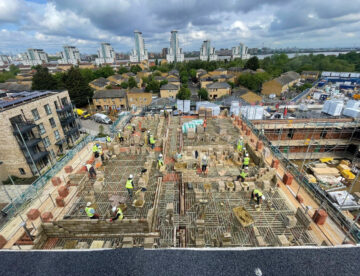
The UK Chancellor’s 2025 Autumn Budget delivered last week has sparked major conversation across the country – not least within construction, where decisions around infrastructure, taxation, workforce development and wage costs will all impact the sector, some positively and some negatively.
So, what are the key measures, and how might they help or hinder construction? In this week’s blog, we’re aiming for a balanced breakdown by highlighting some of the pros and cons.

In the construction industry, cash flow is king. Yet one persistent and unfair practice continues to drain liquidity from subcontractors and smaller firms – retentions.
The National Federation of Roofing Contractors (NFRC) has long campaigned to eliminate or at least reform retentions, and now the Government has launched a major consultation on both late payments and retentions. This is a crucial moment in which the sector can have its say and potentially influence legislative changes. For more information, take a look at this week’s blog.

Late payments have long been a thorn in the side of UK businesses – and for those in the construction sector, they can be the difference between thriving and closing the doors for good. Now, the government is stepping in with the most ambitious reforms in decades, promising to tackle late payments head-on and give small businesses the fair treatment they deserve.
With new legislation on the horizon, this could be a turning point for an issue that has plagued our industry for years. But what exactly will it involve and will it be enough? Keep reading to find out more.

Cyber security threats are escalating across the UK, with more than 40% of businesses and 30% of charities reporting breaches over the past 12 months. Even household names like Marks & Spencer, Co-op and Harrods were recently forced to suspend online operations to contain cyber-attacks.
This surge highlights that cyber-crime is happening right now and it could affect anyone. For organisations, the consequences can be particularly severe, including financial losses, reputational damage and operational disruption. Take a look at this week’s blog to find out what this means for our industry and what Sheriff Construction is doing to protect your data.

As we approach International Women’s Day 2025, the call to ‘Accelerate Action’ for gender equality has never been more urgent. It’s a time to take decisive steps toward creating more inclusive and equal opportunities, particularly in industries that have long been dominated by men.
The construction sector, in particular, is one where gender equality could actually be crucial for future growth and success. One significant initiative making strides in this area is the Women into Home Building programme. Take a look at this week’s blog to learn more.

Last week, the Labour government presented its first Budget for the country in 14 years, introducing a range of measures that they claim will restore stability to the nation’s finances while investing in public services.
As she delivered this Budget, Chancellor Rachel Reeves used building analogies like ‘fix the foundations’ and ‘rebuild Britain’, but what will the changes mean for construction and the built environment? In this week’s blog, we’ll outline some of the key points.

The Home Builders Federation (HBF) has recently announced the launch of a fifth round of its successful Women into Home Building programme, designed to attract more women into site management roles within the construction industry.
Partnering with ten leading homebuilders, the programme offers over 30 training opportunities, support services and work placements to aspiring female site managers. Find out more in this week’s blog.

Falling from heights is the number one cause of fatal and non-fatal incidents in the construction sector in the UK. That’s why it’s really important for construction companies like ours to keep up with advancements in safety technologies.
Among the numerous innovations that are happening in our industry, G decking has emerged as something of a game-changer, not only reducing the risks associated with working at heights but also streamlining workflows and boosting overall productivity. Read on to find out more.

The latest study into the world’s costliest places for construction has placed London at the very top of the list.
Looking at 100 of the world’s largest cities across six continents, the latest Arcadis International Construction Costs (ICC) report ranked London first, ahead of Geneva, Oslo, New York City and then Copenhagen. Find out more in this week’s blog.

New rules that came into play this week mean that developers in England now have to deliver 10% Biodiversity Net Gain when building new housing, industrial or commercial developments.
This makes England the first country in the world to make Biodiversity Net Gain a legal requirement so take a look at this week’s blog to find out more about what this means and how it will be implemented.
